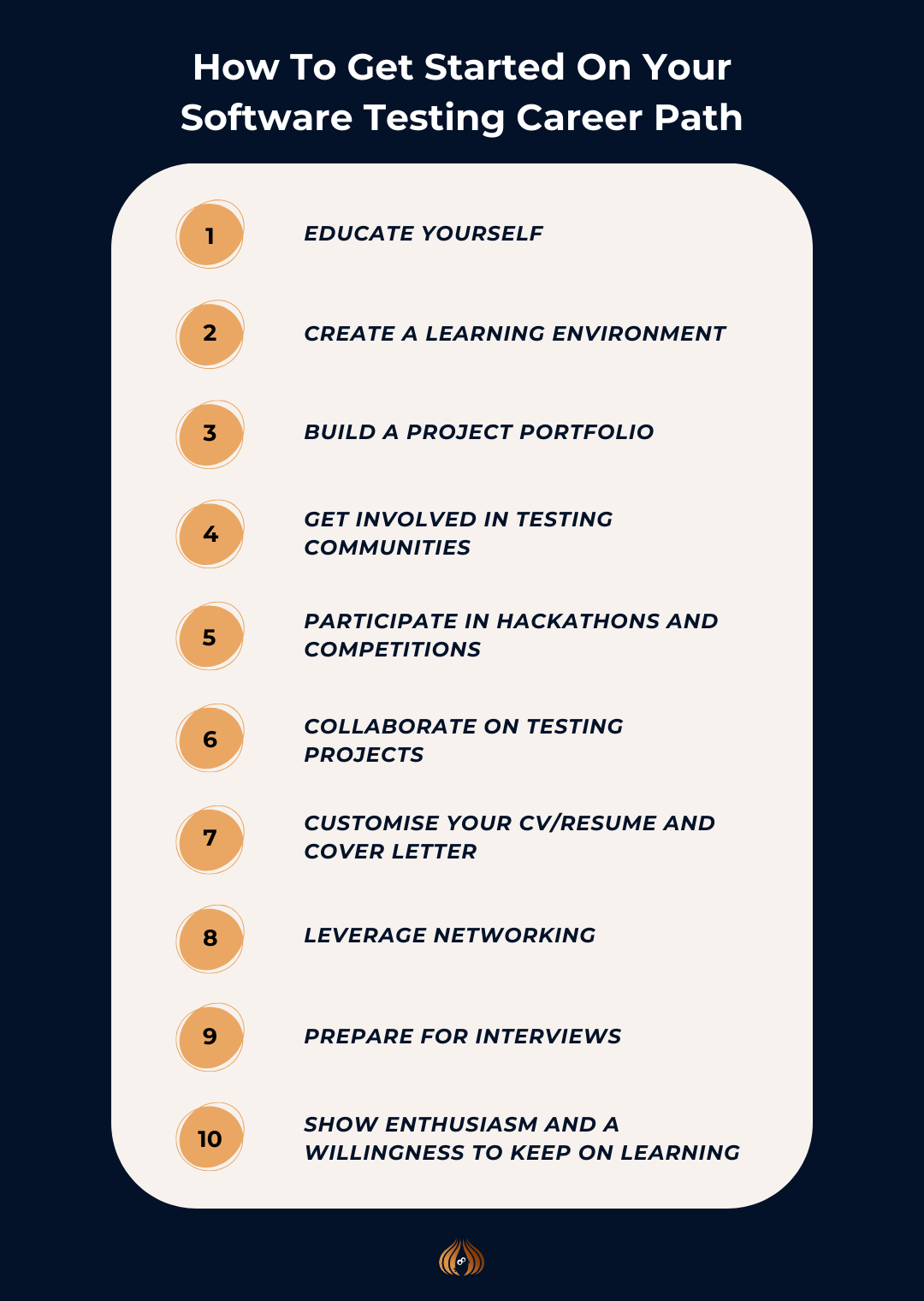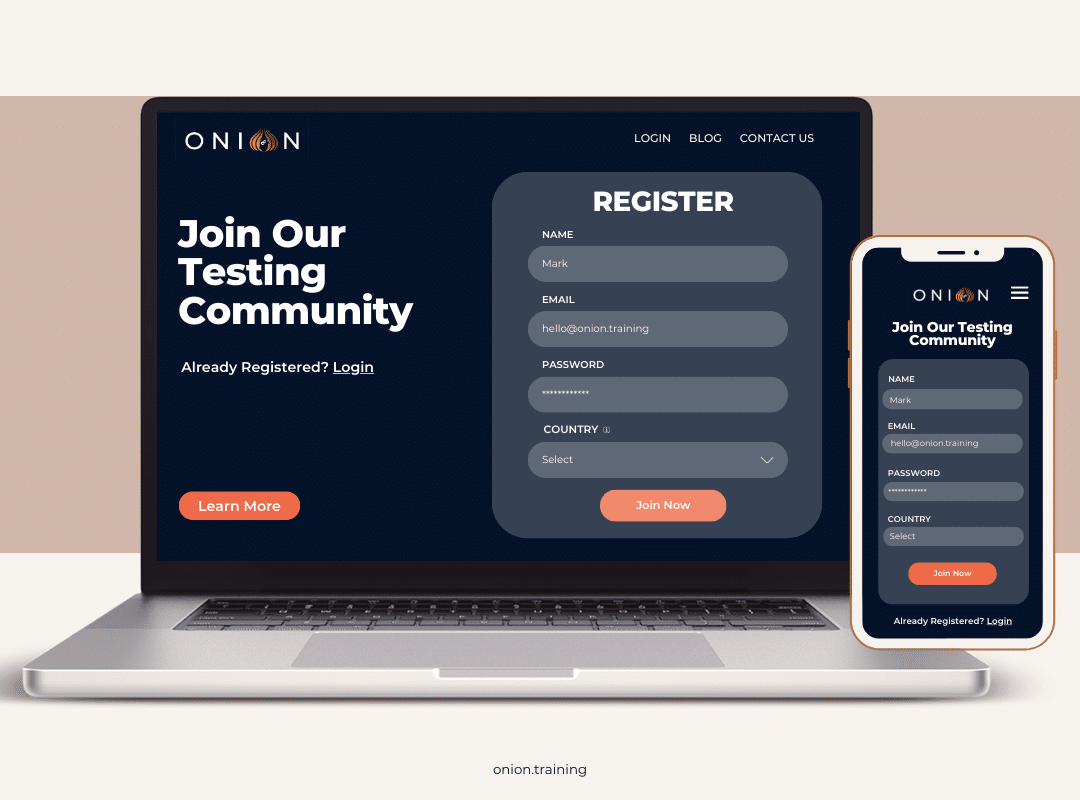It’s a question we get asked all the time and we know it’s no easy task.
The software testing job market is seriously competitive and the absence of actual experience is a major obstacle when attempting to find a software testing job without experience. It’s frustrating and it’s a reality we face.
But don’t despair! There are ways to overcome this hurdle: by engaging in relevant projects that closely resemble real-world experience.
Table Of Contents
- 1 How To Get Started in Securing a Software Testing Job
- 2 Step 1: Build Your Foundation with Education
- 3 Step 2: Establish Your Testing Playground
- 4 Step 3: Build a Project Portfolio
- 5 Step 4: Get Involved in Testing Communities
- 6 Step 5: Participate in Hackathons and Competitions
- 7 Step 6: Collaborate on Testing Projects
- 8 Step 7: Customise Your Resume and Cover Letter
- 9 Step 8: Networking
- 10 Step 9: Prepare for Interviews
- 11 Step 10: Show Enthusiasm and Willingness to Learn
How To Get Started in Securing a Software Testing Job
By following the steps below, you can learn how to develop projects for your portfolio and effectively showcase your skills to recruiters in getting a software testing job. It will demonstrate that you possess the necessary experience and are capable of delivering results.

Step 1: Build Your Foundation with Education
Start by acquiring the necessary knowledge and skills in software testing. Familiarise yourself with testing methodologies, explore various tools and grasp industry best practices. Take advantage of online courses, tutorials and resources to establish a solid understanding of the fundamentals.
Consider enrolling in courses that cover different types of software testing, such as functional and non-functional testing techniques. Our online training course covers all aspects of software testing starting with the basics needed to be successful in securing a software testing job.
Be aware of the most popular testing tools available in the industry and keep up to date on the latest trends. This educational groundwork will enhance your theoretical understanding and also provide you with practical insights into software testing.
Engage in hands-on exercises and real-world examples during your learning process. This will help you apply theoretical concepts to practical scenarios, preparing you for the challenges you might encounter in a professional setting. Remember, the more comprehensive your education, the better equipped you’ll be to navigate the competitive landscape of the software testing job market.
Step 2: Establish Your Testing Playground
Take the next step by creating a dedicated learning environment on your computer, providing you with a space to explore testing techniques and tools. Install relevant testing software, craft test scenarios and actively engage in executing test cases. The practical insights gained here will not only deepen your understanding but also instil confidence in your capabilities when searching for a software testing job.
As you navigate through different testing scenarios, consider documenting your experiences and solutions. This can serve as a portfolio of your practical skills, providing actual evidence of your competence.
Creating a learning environment for software testing doesn’t always require personal projects. You can use existing websites, such as those for banking apps or retail stores, to practice and enhance your testing skills. Here’s how you can go about it:
- Choose a Website: Select a website that you frequently use or one related to the industry you’re interested in (e.g., a banking site, or an online retail store).
- Identify Test Scenarios: Define various test scenarios based on the functionalities of the website. For instance, if it’s a banking app, you can create scenarios related to account logins, fund transfers, or statement viewing. For a retail store, focus on tasks like product searches, adding items to the cart and completing a purchase.
- Explore Different Browsers and Devices: Test the website on different web browsers and mobile devices to ensure compatibility. This will help you understand how variations in browsers may impact the user experience.
- Perform Functional and Non-functional Testing: Conduct functional testing to check if the website features work as expected. Additionally, explore non-functional aspects like performance and usability.
- Practice Automation (if possible): If the website allows, explore automation tools to automate repetitive test cases. This will give you exposure to automated testing, a valuable skill in the industry.
- Document Your Findings: Keep a detailed record of your test scenarios, test cases and the outcomes. This documentation will serve as evidence of your practical experience and can be added to your portfolio.
- Stay Ethical: Ensure that your testing activities are ethical and comply with the terms of use of the website. Never attempt to compromise the security or integrity of the site.
By using existing websites, you not only gain practical experience but also demonstrate initiative and adaptability. This hands-on approach, even without personal projects, can significantly contribute to your skill development while seeking a software testing job.
Step 3: Build a Project Portfolio
In the absence of formal work experience, focus on developing a strong project portfolio. Develop personal projects that mirror real-world scenarios, For example, build a testing suite for a simple application or collaborate with open-source projects to contribute to their testing efforts. Document your projects and showcase them in your portfolio ready for that software testing job.

Here’s a roadmap to build an impactful portfolio:
- Create Personal Projects: Develop a testing suite for a straightforward application or initiate collaboration with open-source projects to contribute to their testing initiatives. This hands-on experience will not only enhance your skills but also provide tangible examples for your portfolio.
- Document Your Projects: Take the time to thoroughly document your projects. Detail the objectives, methodologies employed and the outcomes of your testing efforts. This documentation serves as a comprehensive record of your practical experience.
- Generate Test Cases and Reports: Build a library of well-structured test cases for each project. Additionally, produce detailed test reports outlining the testing process, identified issues and resolutions. This demonstrates your ability to conduct thorough testing and communicate findings effectively.
- Presentation of Data: Utilise online tools like Jira dashboards or other reporting tools to present your testing data. Explore various widgets and features that these tools offer to create visually appealing and informative reports. Effectively presenting your data showcases your attention to detail and professionalism.
- Highlight Problem-Solving: Emphasise how you tackled challenges during the testing process. Showcase your problem-solving skills and the strategies you employed to overcome obstacles. This adds depth to your portfolio and demonstrates your ability to navigate real-world testing scenarios.
- Continuous Improvement: Regularly update your projects and portfolio as you acquire new skills and take on additional challenges. This reflects your commitment to continuous learning and improvement for progressing in your software testing job.
Step 4: Get Involved in Testing Communities
Join online test forums, social media groups and professional networks specifically tailored to software testing. Engage with other testers, ask questions and contribute to discussions. This not only enhances your knowledge but also helps you establish connections within the testing community that can lead to a software testing job.

Here’s how you can make the most of these communities:
- Join Relevant Platforms: Seek out online platforms, forums and social media groups that focus on software testing. Platforms like Onion Testing Community, or LinkedIn groups can be excellent places to start.
- Engage and Ask Questions: Actively participate in discussions by asking questions and sharing your insights. Don’t be afraid to seek guidance from more experienced testers. Engaging in thoughtful conversations helps broaden your understanding and provides valuable perspectives.
- Contribute to Discussions: Share your knowledge and experiences to contribute to ongoing discussions. Offering solutions to problems or sharing best practices not only establishes your credibility but also solidifies your presence in the testing community.
- Networking Opportunities: Use these platforms for networking. Connect with fellow testers, professionals and potential mentors. Building a network within the testing community can open doors to valuable software testing job opportunities and collaborations.
- Stay Updated: Keep yourself informed about the latest trends, tools and practices in software testing. Participating in these communities ensures that you stay current with industry developments, enhancing your overall knowledge and market relevance in pursuing a software testing job.
- Attend Virtual Events: Explore virtual events, webinars, or conferences related to software testing. These gatherings provide additional avenues to connect with professionals, learn from experts and stay inspired.
- Respectful and Supportive Interactions: Ensure that your interactions are respectful and supportive. Cultivate a positive online presence, as this can contribute significantly to your professional reputation within the testing community.
Step 5: Participate in Hackathons and Competitions
Take part in software testing hackathons or competitions. These events provide opportunities to test real applications and solve challenging problems.
Participating in software testing hackathons or competitions is not only a thrilling experience but also a strategic move to boost your professional standing. It provides a platform to validate your skills, gain exposure to industry advancements and connect with influential individuals in the software testing community.
Step 6: Collaborate on Testing Projects
Reach out to developers or small software companies and offer your testing services on a volunteer basis. This allows you to gain practical experience, collaborate with professionals and expand your network for getting a software testing job. The projects you contribute to can be added to your portfolio as valuable experience.
Step 7: Customise Your Resume and Cover Letter
Tailor your CV or resume and cover letter to highlight your relevant skills, projects and achievements for a software testing job. Emphasise your learning experiences, personal projects and any contributions made to the testing community. Focus on showcasing your problem-solving abilities, attention to detail and ability to work in a team.
Step 8: Networking
Attend industry events, meetups and conferences related to software testing. Networking with professionals in the field can lead to potential software testing job opportunities or referrals. Don’t be afraid to introduce yourself, share your journey and express your enthusiasm for software testing.
Here’s how to make the most of these networking opportunities:
- Identify Relevant Events: Research and identify industry events, local meetups and conferences focused on software testing. Platforms like LinkedIn, Dev Events, or industry-specific websites are great resources to find upcoming gatherings.
- Prepare Your Introduction: Craft a brief and engaging introduction about yourself, highlighting your passion for software testing, key skills and any notable experiences. Being ready to articulate your journey makes it easier to initiate conversations.
- Network Proactively: Don’t hesitate to approach professionals during events. Introduce yourself, express your interest in software testing and inquire about their experiences. Networking is about building relationships, so be genuine and open in your interactions.
- Attend Workshops and Sessions: Participate in workshops and sessions offered during events. This not only deepens your knowledge but also provides additional opportunities to connect with professionals who share similar interests.
- Volunteer or Engage in Panel Discussions: If possible, volunteer to assist with event organisation or participate in panel discussions. This involvement not only demonstrates your commitment to the community but also puts you in direct contact with industry leaders.
- Utilise Social Media: Utilise social media platforms to connect with event organisers, speakers and fellow attendees before, during and after the event. Platforms like LinkedIn and Twitter are particularly effective for professional networking.
- Express Enthusiasm: Share your enthusiasm for software testing when networking. Passion is contagious and expressing your genuine interest can leave a lasting impression on the professionals you meet.
- Collect and Share Contact Information: Collect contact information from individuals you meet and share your own. Follow up with a friendly message expressing your pleasure in meeting them and expressing your interest in staying connected.
- Attend Social Mixers: Take advantage of social mixers or networking sessions during events. These informal settings provide an excellent opportunity to connect with professionals on a more personal level.
- Stay Open to Referrals: Communicate your career aspirations and be open to discussing potential software testing job opportunities or referrals. Building a strong professional network increases the likelihood of being considered for roles within the industry.
Step 9: Prepare for Interviews
Study common software testing job interview questions and prepare concise and thoughtful answers. Even without prior work experience, you can demonstrate your knowledge, problem-solving skills and passion when applying for a software testing job. Use examples from your projects and learning experiences to illustrate your abilities.
Step 10: Show Enthusiasm and Willingness to Learn
During interviews, convey your passion for software testing and your eagerness to learn and grow in the field. Highlight your adaptability, ability to quickly grasp new concepts and your dedication to delivering high-quality results. Employers often value attitude and potential as much as they value experience.
Remember, landing a software testing job without actual work experience may require persistence and patience. Stay motivated, keep learning and continue building your portfolio. With the right combination of skills, projects and networking, you can prove your worth and secure a software testing job.
Related Articles
Become A Quality Assurance Tester: 5 Must-Know Tips
16 Undeniable Reasons Why AI in Software Testing Cannot and Will Not Replace Software Testers

